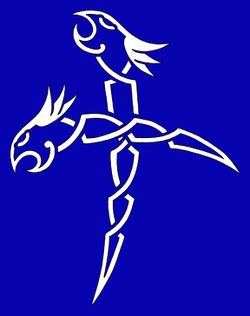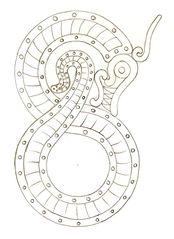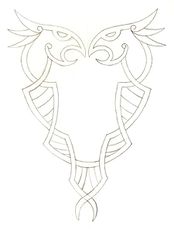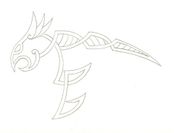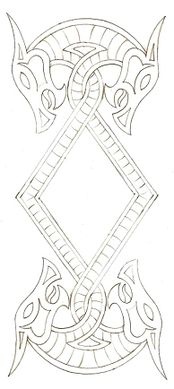Thule
Overview
Across the northern mountains, beyond Wintermark and Varushka, lies the cold land of Otkodov where the Dragons rule. The Thule, ruled by their warlocks; cold, calculating and hungry for power, are a formidable force not because of their magical power but because of their potent ability to wield it where it can cause the greatest damage. In the past they have been like cold-hearted locusts, descending on human settlements and stripping them of their assets before fading back into the mists and shadows. In recent decades they have changed their tactics, attacking in force and conquering Imperial territory for their own inscrutable purposes. Since Summer 379YE, a tentative peace has held between the Thule and The Empire, which was extended in Summer 382YE. This included a military coalition against the Jotun which successfully drove them from Sermersuaq.
The Nation
The Thule are ruled by their magicians. Almost all positions of authority seem to be held by those capable of working magic. Ritual magicians - or warlocks - hold more power than those who focus on the performance of incantations, and the nation as a whole is ruled with an iron fist by potent, aged shaman-ritualists called the Dragons.
There is a great deal of competition between warlocks over magical resources, and for access to regio and mana sites. Whilst this competition is often fierce, the Thule always stick together in defence of their nation. They seem to be particularly concerned with the ideas of stability and unity, and place great value on societal structures which are resilient to change and chaos.
Those unwilling or unable to master magic take second place to their magical leaders - they are accorded few rights and survive by currying favour with the warlocks and their covens. There is little opportunity for Thule who are not ritual magicians to progress, although the bravest and most successful warriors may come to enjoy the patronage of a powerful warlock and enjoy access to great wealth and prestige. Skilled artisans are something of an exception - although they have no political power, they are considered on a par with lesser warlocks, and enjoy a degree of protection and influence as a consequence.
"Thule are thieves" as they say in some parts of northern Varushka. Even when they are not stripping an area of valuables, they are known to strip the dead for anything that may be of use. The value they place on raw materials may go some way towards explaining why they are the most cautious of the nations that have threatened the Empire - they seem to abhor waste. This is widely believed to suggest that Otkodov is relatively resource-poor compared to the Empire.
The Thule were slavers, until they gave up the practice in the hope of securing imperial aid. Slaves were poorly treated and sometimes worked to death. Now that they are free, the former slaves labour in hard conditions for scant pay, but they are significantly better off than they were. For years there were also allegations that the Thule fed their slaves on the remains of other slaves. From information gathered since the Thule abolished the practice of slavery, it seems unlikely this ever actually occurred. Instead, it is likely that this was deliberate misinformation spread by some overseers amongst their slaves to keep them in line. Every example which has been found was of slaves being told that another overseer, to whom they might be sent if they did not shape up, engaged in the practice.
The intricacies of Thule society are not well-known to Imperial citizens, and they seem to take pleasure in cultivating an aura of mystery. Prisoners rarely speak about the business of their nation, apparently being much more afraid of the Dragons than they are of death or of the Howling Abyss. In recent years, some information has come to light through trade and diplomacy, which is collated in the Thule lore page
5 things to know about the Thule
- Magic is power - their nation is built around the study and casting of magic. Otkodov is a magocracy, ruled by its magicians.
- The Dragons are eternal - Dragon is the name given to the five rulers of the Thule. They are allegedly immortal magicians who rule with absolute authority. None have been seen by Imperial eyes.
- Everyone serves - Thule society is highly organised into strict castes, and social mobility is only by magical prowess.
- Pity is weakness - life in the frozen north is harsh, and the Thule are not against using cruelty to achieve their strategic aims, though they do not relish it as the Druj do.
- Patience wins - they are always playing the long game, and will wait and prepare rather than act suddenly and rashly.
What the Thule are not
- Cannibals or Sadists - Despite old rumours to the contrary, the Thule do not consume the fallen nor do they engage in torture for its own sake.
- Mind Controlled - Whilst the Dragons rule with absolute authority, and the Thule are fiercely loyal to them, they all have free will (with one possible exception, see Hollowed below). The Dragons do not mind control their subjects.
History
From extensive interrogation of captured prisoners, the Empire has built up a basic understanding of Thule history. They may have had its roots in the Jotun, but split centuries before the arrival of the Highborn and formed a distinct nation that dominated what is today Otkodov and the northern Imperial territories. The cause of the split appears to have been dissatisfaction among several cabals of ritual-working shamans, influenced by certain 'malign ancestors.' There is no way to tell how trustworthy this version of their history is; Thule tell the story differently, claiming the Jotun were founded by traitors who forsook the protection of the Dragons and as a consequence have no understanding of true power (magic). Regardless of where they originally came from, the fact remains that the Thule have been in Otkodov since long before the arrival of the Vard and the Steinr.
For the most part, the Thule kept to themselves apart from occasional raids into Wintermark and Varushka, most commonly after particularly harsh winters. Over the last century or so, however, the Thule have become more aggressive, and have been particularly vicious in raids against mana sites, mines and forests. This culminated in 366YE with a serious campaign of conquest against the Varushkan territory of Karsk which fell to the Thule in 368YE. Shortly after, in 373YE they attacked Skarsind in Wintermark under the aegis of a supernatural blizzard and with the assistance of a dozen enslaved Artok shattered the Imperial defence and claimed the territory.
Warriors of the Thule
Among the armies of the Thule, certain warriors especially stand out. They include:
- The Warlocks are generally ritual magicians who control Thule society. They tend to focus on the magic of Autumn and Day, but individuals have also demonstrated mastery of the other realms. They often deal with eternals, and have the power of life-and-death over members of their band who are not magicians.
- The Spellbinders are magicians who focus on battlefield magic. They are usually armed with staffs and wear mage armour, and possess a full range of magical powers especially tactically useful spells (entangle, repel and paralysis) or spells that support their warriors (especially heal). The spells venom and weakness are uncommon among Thule spellbinders. Spellbinders are usually supported by a cadre of warriors who are prepared to lay down their lives for their masters.
- The Black Maggots (as the Winterfolk call them) are units of semi-elite warrior-Thule who focus on looting battlefields. They are usually light skirmishers, moving wherever the fighting is drawing to a close. They are especially despised by the Winterfolk, and their sole purpose appears to be stealing crafted items and resources from the fallen for use by the Thule. They are indiscriminate; they loot their own warriors with as much gusto as they strip fallen Imperials. They are killers, dispatching fallen warriors on either side who they judge cannot be saved; but they are also healers. The Thule themselves call them Cruel Ones or Grasping Hands and treat them with a mixture of fear and respect, because they often carry potions or bandages that can be used to save warriors they deem 'worthy'.
- The Hollowed are sinister figures who seem to serve as advisors to the warlocks. They are often painted with runes, but rarely wield weapons or wear armour. Their eyes are said to be "empty" - examination of corpses has shown a distinctive discolouration of the eye sockets, like a spreading black bruise that appears to be 'natural' rather than the result of make-up or tattoos. The Dragons apparently use them as vessels which they can somehow "inhabit" from time to time. It is said that the Dragons can see through their eyes, speak through them, and even perform magic using them as a tool. No hollowed has ever been captured alive - the Dragon that controls them seems able to destroy the vessel at will. By use of the hollowed, the Dragons can maintain a watch over the nation and provide a level of communication and cohesion that other armies can only dream of.
- Beasts, both mundane and magical, are a fixture of Thule armies. Unlike the Druj or the Grendel, the Thule do not make much use of subject peoples on the battlefield; rather they make extensive use of trained creatures, undead husks, and spirits. They are known to bind and magically manipulate various creatures, creating useful battlefield minions. Examples include the bound Artok used in the attack on Skarsind; the undead husks they have used extensively in recent campaigns; conjured eternal mercenaries; and a variety of twisted beasts such as the upright-walking dire wolves that have been spotted in some parts of Karsk.
Magic
Magic is at the heart of the Thule nation; where others may value physical strength, the Thule value the use of magic. They are ruthless in their pursuit of mastery, and heartless in its application. Thule magic is often visceral and passionate. Spring or Summer rituals may be bound up in pounding drums and chanting, for example, while Autumn and Winter rituals might involve carefully chosen runes scribed in blood with a potent implement. Rituals often involve invocations of the Dragons, or appeals to a relevant eternal, in a manner similar to Imperial theurgy or Goetia. Indeed it is not always clear when a warlock is beseeching a great and powerful being for magical gifts whether they are appealing to a Dragon or an eternal.
Look and Feel
The Thule favour dark, hooded robes and cloaks, emphasizing their size and bulk with fur pelts over their shoulders. A dark blue underlayer is common, and they consider a dark blue hue to be fortunate.
They revere dragons and wyrms as totemic beasts full of potence and cunning. They commonly depict animal skulls on their banners - they are particularly fond of mocking the totem animals of their enemies, and may surmount their banner pole with a dead eagle or an eagle's skull when fighting the Varushkans.
Mage armour is common, even among ritual magicians. Staffs are preferred weapons, although the spellbinders typically favour rod and shield combinations.
The Thule make extensive use of the Wintermark runes, often displaying them in highly stylised, intricate forms. Scholars are divided as to whether this use of runes has been adopted from their Imperial enemies, or derived directly from the ancient runes in parallel with the human versions.
Playing the Thule
- Groups and armies are led by magicians called warlocks, who use all types of ritual magic extensively
- They are organised into coven-banners, with the largest ritual group leading
- Crafters are highly respected as 'half magicians'
- When at war with the Empire they raid into Wintermark and Varushka, typically stealing mana and other magical resources.
- They are patient, careful, and smart.
- They are ruled by five 'Dragons', allegedly immortal orcs who lead them.
- Their armies are often supported by the Hollowed, failed shaman with no emotions, who serve as conduits for the will of the Dragons. They make very little noise and don't talk above a whisper.
- They supplement their armies with undead husks, ritually summoned creatures, and magically twisted or enslaved beasts and monsters
Further Reading
First came the mist.
As we waited on the edge of the glacier, we watched it rolling from the crevasses, up through the ice and from the narrow passages scarred into the mountainside. Cold and grey, it licked first at our boots, our ankles, our knees, rising until it sat around us in a thick muffling fog, caressing our skin with its frozen dead touch.
Next we heard them; phantom voices, shuffling steps, all distorted by that damned mist. The line started to falter, looking from side to side for the source of the dull keening that seemed one moment a mile away and the next inches from your ear. I could hear the scop's voice, low and insistent as she fought to calm the green troopers at her side; hear her tone rising as she began to lose her own courage. Then out of the mist they came, slack-faced, empty eyed, and shambling like the walking corpses they were. Some were rotted to skeletons, others still wore flesh and blood-soaked furs. They had been Suaq once, but no longer. I forced myself to look away from their faces. Better not to recognise them.
They fought silently, as my comrades raised weapons and shields, hacking apart dead flesh with grim efficiency despite the fear that threatened to grip us all. They came, unarmed and seemingly endless, clawing over the carcasses of their fellows to reach us. Each alone was little threat, but they struck in force and in great numbers, and more than one of us found himself overwhelmed and dragged to the ground by cold hands. Wave after wave, on and on they came, until it seemed that the day was lost, that surely the retreat would sound -until at last, there seemed a break in their line, and the fog began to lift. A ragged cheer rose up around me; we pressed forward, pursuing the husks that seemed suddenly in retreat, chasing them down with renewed courage and vigour as the sun slowly melted that cursed fog away to nothing.
Only I saw him. A lone, orcish figure, hulking and black against the ice of the mountainside, a twisted black iron staff in his hand. Perhaps it was my imagination, but he seemed to acknowledge me, one hand raised in a mocking salute. His cold laugh carried on the wind towards me, and my heart turned to ice at the sudden knowledge that we had all been tricked, and that the real attack was elsewhere.